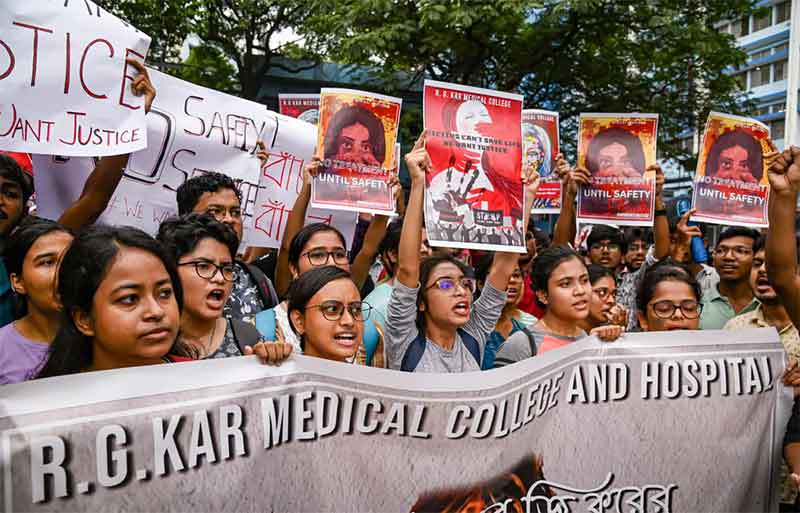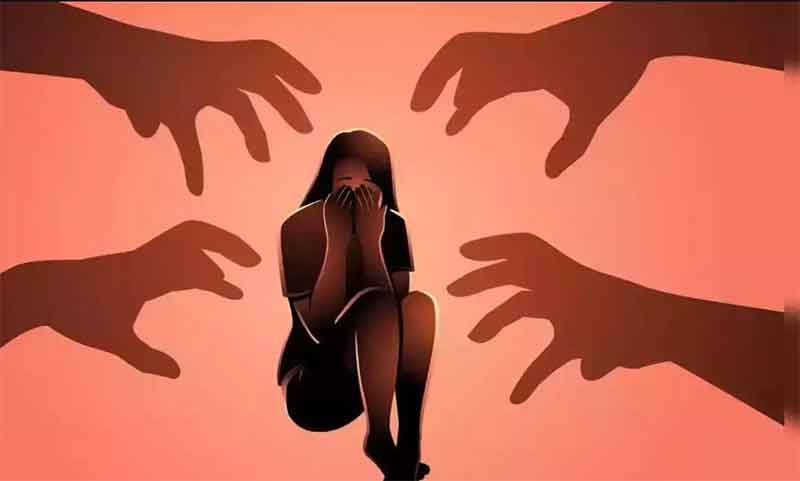by Azmat Sadiq & Gunjan Das

In the wake of nationwide protests over the brutal rape and murder of a resident doctor at R.G. Kar Medical College in Kolkata, there has been a reported 160-190 percent surge in Google search rates for the digital footage of that incident. The study carried out by The Quint also revealed that the victim’s name was searched more than 3000 times on various pornographic websites. Moreover, looking at similar events in the past suggests that this ‘online voyeurism’ shouldn’t be seen as an isolated event or as an instance of sexual deviancy. During Manipur’s sociopolitical turmoil last year, two Kuki women were paraded naked and subsequently raped. The internet was filled with similar queries, asking for the video footage of the sexual assault. Interrogating these social instances reflecting gendered power relations begs a crucial question: why does an act of serious violence like rape fail to elicit the moral sensitivities among us and instead become a source of sexual gratification for many?
It is to examine why our moral standpoint regarding the treatment of women set under the society gets tainted. It is to identify those human actions that may elude our attention, but seriously tell us about the patriarchal norms guiding our society. It is then we ask: Why does our moral conscience gets compromised as we try to derive pleasure from an act of violence as serious as rape? And much deeper than even that, how does our moral judgment engendered under a patriarchal society itself develop biases against women, to an extent that we no longer see violence as violence anymore?
Asking these questions brings forth the troubled relationship among the categories of morality, sexual violence and our conception of bodily desire.
Men’s Eyes turn Women into a “Site of Pleasure” :
To address these issues, we need to identify the multiple manifestations of masculine domination that exist all around us. On August 22, the online news outlet Brut. released a short video clip gathering the responses of several individuals in Central Delhi to ascertain why sexual violence occurs in India. One of the interviewees compared men to “bhukha sher” (hungry lions) who get aroused as a result of “invitations” from women due to their “asking for it” attire and see women as their prey. He went on to explain that in order to avoid the fate of sexual violence, women must control themselves and follow the social constraints established by patriarchal standards (like a modest dress code and curfew).
It is interesting that a similar thought process is often observed among the male perpetrators of sexual violence. They justify their act of violence through an argument of “moral degeneration of modern societies” where traditional norms ascribed to women have been compromised. It provides them with the license to “teach women some lessons” to keep the “moral order” of the society intact. This was observed during the interrogation of the rapists of the Nirbhaya gang rape of 2012. In the 1992 case of Bhanwari Devi, her interference in a social practice and defiance of the traditional passivity of women was seen as “crossing the line” by the men of her village. She was subsequently raped in order to put her in her “actual place” and to further perpetuate the deference of the women to the established social order. The victim blaming often originates from an imagination of “how women should behave” and a feeling of “moral degeneration of society” orchestrated within the offender’s mind, which attempts to legitimize the assault on women.
It is obvious that the notion of an “ideal and moral patriarchal order” is brought up every time we point towards what a woman is wearing, or ask why she was out late at night or inquire about her character. And this ideal moral order is shaped and maintained by a pervasive power relation between men and women. And this social construction of our morality is so strongly anti-women at times that it often weakens the moral stand we collectively take against violence. Thus, serious harm against women fails to generate a strong sense of empathy towards the victim and discipline our actions on the treatment of women. This negation of our moral position on violence against women denies them of equal dignity and reduces them to a sub-human existence where we feel it is okay to search up the name of the rape victim on a pornographic website, expecting to be pleased by the voyeurism of a violent and morally wrong act.
However, the story does not end here. Things become further clear when we embark upon some other aspects of our social life that we often talk about, but seldom look at from the viewpoint of morality.
The Social Construction of Bodily Desire: How Society Constructs Legitimate and Illegitimate Desires; Looking at the Case of “Porn” & Marital Rape:
Another example of people’s lack of moral sensibility against sexual violence is the manufacturing of porn, specifically “rape or revenge porn”—a type of porn in which sexual acts are depicted as rape. Categories such as “leaked video clips” circulated without consent, “gangbang”, revenge porn, and “hardcore” porn represent the gratification of the male psyche by inflicting violence and humiliation on women. Despite the inherent awareness of those categories being morally wrong, many people, secretly or out of “guilty pleasure”, enjoy them. This indicates some important aspects of the desire and ethical dilemma of porn.
Living under a patriarchal society, the body gets inscribed with patriarchal norms. Thus, what we regard as our sexual desires are not merely bodily desires, rather they are a reflection of the deeply gendered politics of our society. The body in a patriarchal society doesn’t merely become a “site of power” (as is well recognised) but also becomes an “effect of power”, meaning that the body is not merely a site on which power acts, but the construction of the body is coterminous with power itself (the body becomes a body because it is invested with power). Hence, it allows the body to become a “site of repression” under power relations.
As the French Political Philosopher, Michel Foucault has aptly remarked, “The Soul is the Prison of the Body”. The soul here represents the patriarchal norms that we have internalized and which distorts the conception of our bodies and its desires. And it is the distortion of our bodily desires that overpowers our moral instincts and allows us to derive pleasure out of numerous fantasies and imaginations, including sexual violence. This shows that what we desire and how we fulfill it is socially determined. So men derive pleasure not only from the mere act of sex but also from the fantasies and imaginations promoted by certain forms of porn, which itself is a product of women’s objectification under a patriarchal society.
The case of marital rape is crucial in this regard. While feminists argue that rape is rape no matter what form it takes, the socio-legal structures of our society doesn’t regard rape within a conjugal union as rape but as a normal act of sex. Not only that, the husband committing a crime of rape against his wife doesn’t regard his act as rape but as a legitimate sexual desire which he has a right to fulfill. Marital rape escapes law and punishment because patriarchal institutions provides legitimacy to certain forms of violation of women’s rights. In that context, recognizing women’s right to consent is not considered as necessary if it is done under a social institution like marriage.
The case of marital rape, therefore, highlights how patriarchal power distorts our perception of violence against women and our sense of bodily desires. Instead, it ends up shaping socially oppressive notions of legitimate and illegitimate sexual desires and acts.
Also, in marital rape, the satisfaction of their masculinity stems from the confirmation of the male ego as the superior sex, as well as the desire to dominate women. Under patriarchy, an act of violence becomes, therefore, a source of pleasure, revealing a major breakdown in moral sensibilities and the prevalence of rape culture in our society.
Rape as a Medium of Domination: Politics, Patriarchy & Power
It is necessary to recognize that patriarchal power pervades the entirety of our society – what Michel Foucault described as the ‘capillary’ functioning of power (power flows in a society as blood flows in our blood capillaries, i.e., to every nook and corner of it). An individual act of rape in this sense is not merely a violation of the woman’s body but a violation of her very humanity. In committing the crime of rape the male offender seeks to destroy the woman and through this destruction attempts to realize his own power which is nothing but the power of patriarchal society.
Subscribe to Our Newsletter
Get the latest CounterCurrents updates delivered straight to your inbox.
Following Freud, French psychoanalyst Lacan observes that the influence of social structure around us is so deeply ingrained in the human psyche that the language we frequently use to communicate without conscious filtration demonstrates the far-reaching role that the structure plays in the formation of human attitude. The use of phrases like “hungry lion” or “invitation” indicates the objectification of a woman’s body, which is treated as something to be conquered and enjoyed. It is the ‘otherization’ of a sex, the reduction of women to an object form that turns a woman’s body into a “site of pleasure”, where consent appears unnecessary.
The workings of patriarchal power have been so imperceptible in our society that it takes a ‘Nirbhaya’ to awaken our conscience and informs us of our deep complicity in the all too pervasive rape culture. No, the Kolkata rape and murder case was not a “Nirbhaya 2,” as some on social media are claiming it to be. According to French Marxist Louis Althusser, the fact that we are unaware that we are ‘subjects’ to this prevailing hegemonic system is the fundamental condition of our ‘subjectivation’. Similarly, our ignorance of the deeply ‘violent’ nature of our society permits rape culture to become so normalized. It takes an act of inhuman brutality that forces us to open our eyes, just for us to close them again when things return to ‘normal’. The ‘normal’ is mostly a male privilege. Women do not live in ‘normal’ times and never have. Men and the patriarchy would be wise to remember this.
Gunjan Das: Gunjan Das is a postgraduate in Political Science from Jamia Millia Islamia. He has previously written on politics of ideology, nationalism, class and identity politics with specific focus on Northeast India. An active organizer and participant in student movements occuring in New Delhi, he is involved in progressive student organization COLLECTIVE and founder of its Jamia unit..He can be reached at [email protected].
Azmat Sadiq: Md. Azmatullah Sadiq is a postgraduate in Political Science from University of Delhi. He is a junior level researcher and specialized in the study of Identities and Political mobilizations, politics of space and marginalization, citizenship discourse, film studies and visual narratives and political theory. He can be reached at [email protected].














































